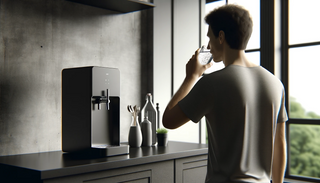What should your drinking water have? How can you ensure optimum hydration?
There’s no question that water plays a vital role in ensuring our bodily organs can function properly and survive in the long run, along with proper nutrition, exercise, and adequate sleep. Drinking water aids in rehydration and quenches our thirst. It also helps regulate body temperature and makes up more than half of our body weight! Water does wonders for our body but, how does hydration even work? How much water do our bodies need to reach their full potential?
We sat with Matt Jones, Performance Nutritionist of West Ham F.C. in London, to talk about the importance of hydration and how you can set yourself up for success by knowing when and how to hydrate if you are an athlete! Along with these, we go deeper with insights into how professional athletes survive their training that help them clinch a win.
Importance of Hydration
Matt frames the importance of hydration through the athletes he has worked with and how the general population can benefit from reimagining healthy hydration. As we take on the day to finish what we have on our plates—may it be in the literal sense that is food or for those who have jobs in the form of work—drinking water whenever we can seems the top-of-mind answer in ensuring optimum hydration.
However, instead of grabbing a coffee as the immediate drink of choice, Matt highlights rehydrating with water first. “Hydration status or fluid balance is an ongoing process. [...] Starting the day, the priority every day should be rehydration. Most people wake up and grab a cup of coffee or something. A fact is they should probably drink around half a liter of water to start rehydration as quickly as possible.”
How much water should I drink in a day?: Hydration Recommendation
With the course of training and leagues athletes participate in, Matt, in the immediate aftermath of a game of their team, encourages their athletes to consume water at least 150% of the body mass they lose through sweat in litres of water to replace fluid lost and rehydrate their bodies, along with electrolytes. But this changes depending upon their day-to-day activities, especially if they have a game at night. “We don’t want them to consume a huge amount of water before they go to sleep because they will just wake up and go to the toilet which pushes the rehydration to the day after tomorrow.”
While it’s recommended to drink at least 8 glasses of water each day, Matt argues that the current gold-standard recommendation for daily fluid intake is around 1 milliliter of water per calorie expended each day. Putting this into context, women typically need 2,000 calories per day which then translates to 2,000 mL of water or simply, 2 liters. However, it’s also imperative to have self-awareness of your body and hydrate throughout the day as needed, and keep dehydration at bay.
Signs of Dehydration and How You Can Prevent It
In a basic sense, all you have to do is just hydrate with water and drink what you lose especially if you are sweating heavily or working out. In managing their athletes’ nutrition, Matt Jones values the importance of habit formation ie. drinking water upon waking up in the morning to kickstart rehydration and intervening at times when their players need it.
The performance of athletes while in the game is usually affected as they lose water in the form of sweat which can lead further to dehydration. While 2% of your body mass is lost as you lose water in your body, going beyond this number and failing to rehydrate can have drastic consequences. “Your brain, your mood, and cognitive function are certainly impacted by dehydration. So, just 2% of your mass in the form of water loss, that’s not a huge amount. But, the further you go, the more dehydrated you become, leading to more severe consequences. At around a drastic 10% loss of water, you’re likely to enter into a coma. So there are serious implications.”
The same applies even if you’re working in a desk job. Matt adds, “If they turn to the office and start working, some symptoms of dehydration that can come up are lethargy, tiredness, and inability to concentrate and focus. This may be rooted back to you feeling dehydrated upon waking up but not resolving the issue through rehydration.”
While these may heavily depend on your frequency and behavior in drinking water, other factors may play a role in how your body responds to dehydration such as your genetics, body type and shape, and immediate environment. Another factor to look out for whenever hydrating is what you hydrate with: does my water contain the electrolytes I need? Do I need a sports drink to support my daily activities better?
What Should I Drink to Hydrate?As with factors that influence your dehydration and water loss, what you should take also varies with what you do. When people exercise and work out, what gets activated is, as Matt puts it, the “small petrol tank of your muscle”, scientifically called the “glycogen stores” which get depleted as you work out and won’t be able to maintain your workout performance for longer periods. To combat this, eating or drinking something light and refreshing like a sports drink can help add required carbohydrates to your body to top up these petrol tanks.
Lastly, the sodium content of water can also make or break your body’s capability to store water. What salt does is effectively retain the water you drink so it keeps you hydrated but like anything else, if you consume beyond what’s recommended it can cause more harm than good. Watch out for your diet and see if you’re consuming foods high in sodium!
Whether you’re an athlete in the big stadiums or a humble office worker with a regular 9 to 5, the common denominator is how our bodies can sustain themselves through the water. Seemingly an innocent liquid matter can make a whole lot of difference along with our now-heightened understanding of how dehydration and rehydration work!




